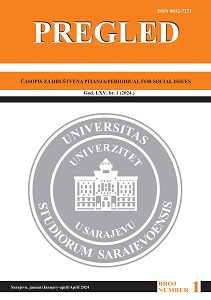Medijska i društvena polarizacija u vremenu krize: BH. mediji i rat u Ukrajini
Media and Social Polarization in a Time of Crisis: Bh. Media and War in Ukraine
Author(s): Lejla TurčiloSubject(s): Media studies, Communication studies, Peace and Conflict Studies, Russian war against Ukraine
Published by: Univerzitet u Sarajevu
Keywords: media; polarization; Bosnia and Herzegovina; Ukraine;
Summary/Abstract: This article examines the ways in which the media in Bosnia and Herzegovina in times of crisis relate to the already existing social polarization and the ways in which they further strengthen it. Theories of social polarization were used, with a special emphasis on interpretive polarization, in which the media play a crucial role. The focus of the research is reporting on the Ukrainian crisis, in order to consider the patterns that have developed in media reporting, especially when it comes to different approaches in the Federation of Bosnia and Herzegovina and the Republika Srpska. The research is based on the method of content analysis and in-depth structured interviews with journalists, editors and political analysts. The sample consists of the 7 most read web portals from BiH: 4 from the Federation of BiH and 3 from the RS, and the corpus totals 50 texts. A search used the keywords: Ukraine, Russia, aggression, attack, invasion, war, and the analyzed period is seven days from the beginning of the attack on Ukraine (from February 24, 2022) and seven days from the date of the first anniversary of the attack on Ukraine (from February 24 .2023). Indicators for analysis are: how the media decide what is newsworthy, how the media choose sources, how the media verify information and how the media shape the story (with special reference to how they shape it in relation to the agenda they set and the public opinion they shape). The goal is to question how much the Ukrainian crisis was used by the media to further polarize B&H society, and the general conclusion is that media reporting only partially fulfills the key roles of providing comprehensive, clear information, contextualizing events and educating the public. The interpretation of the events is selective and in accordance with the dominant narratives and, as such, does not contribute to a complete understanding of the events, and even less to a high-quality social dialogue. As a post-conflict society, Bosnia and Herzegovina should have a much greater sensitivity to the events in Ukraine, and the media should approach this topic with much more attention, responsibility and public interest. This applies equally to the quantity and quality of information available to citizens.
Journal: PREGLED - časopis za društvena pitanja
- Issue Year: LXV/2024
- Issue No: 1
- Page Range: 31-49
- Page Count: 19
- Language: Bosnian

